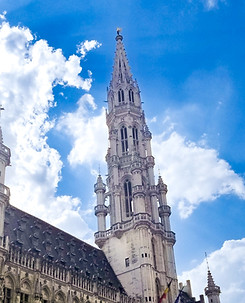
Study Abroad
STUDENT MEDIA INTERN

Student Media Intern
LSU Abroad: Media and Politics in Europe
Summer 2019
I worked as a student media intern in the summer of 2019 while I studied abroad in Europe. I traveled to England, France, Belgium, the Netherlands, Germany and the Czech Republic during the four-week program.
Alongside other communication students, I met with authors, members of parliament and international media professionals.

While traveling, I also utilized my professional camera equipment to capture and edit images at historical sites across the six European countries and conducted interviews with European media professionals, politicians and authors to develop articles for the LSU School of Mass Communication. Click here to read the piece I wrote on our experience at the D-Day Beaches in Normandy.

LSU Abroad:
Media and Politics in Europe
Summer 2019
"Media and Politics in Europe explores six European countries in just four weeks. In the two courses, Comparative Media Systems and Media Ethics & Social Responsibility, students analyze the relationship between media and politics in reference to the United States and the four countries they visit. They also examine the strategies that governments, political parties, political consultants and activists use to influence the news media, as well as the role of mainstream and non-mainstream media outlets in each country."
- LSU Academic Programs Abroad
WHERE WE TRAVELED
22 Cities - 6 Countries
London
Oxford
Windsor
Hayes

England
Amsterdam

Netherlands
Paris
Normandy

France
Berlin
Hanover

Germany
Brussels
Antwerp

Belgium
Prague
Karlštejn

Czechia
Published Content
As the Student Media Intern for my study abroad program, I not only had the opportunity to completely immerse myself in the intellectually and culturally enriching journey across the six countries we visited but I also got to share those experiences on behalf of my senior college, The Manship School of Mass Communication. The program consisted of two media and communication courses: Comparative Media Systems Abroad and Media Ethics & Social Responsibility. This means that during our travels, we had the chance to speak with European media professionals, politicians and authors about the role the media played in shaping public opinion and the relationship between European media and politics and the United States.
I wrote several pieces on our experiences with the media professionals and shared insight into my experiences when we had the freedom to explore the cities on our own. One of the most profound experiences was visiting the D-Day Beaches in Normandy. I had the chance to reflect on how that visit impacted me and my fellow classmates in an article published on the Manship School of Mass Communication website.
The Gallery
To keep my photos organized, I created a website that served as the trip photo album. The photos you see below are the raw photos I took on my professional photography equipment as we traveled across the six countries. I edited a few photos of the architecture and of the students on the trip with me. I used Adobe Lightroom on all of the photos I edited, creating specialized filters for each person whose photos I edited.
Below you will find a few of my favorite photos from my gallery.
The Courses
Summer 2019
Comparative Media Systems Abroad
The purpose of this course was to explore the role of print and electronic media in politics in Europe and the United States. We analyzed the relationship between media and politics in general, but primarily by reference to the United States and the following countries: Great Britain, France, Germany, Belgium, and the Czech Republic.
During our time in each country, we examined strategies used by that country’s government to influence the media. We also examined:
-
strategies used by popular domestic movements
-
international organizations
-
interest groups to influence public policy
-
mainstream and non-mainstream media outlets
via instructor Robert Mann
Summer 2019
Media Ethics and Social Responsibility
This course provided a basic understanding of moral reasoning and a framework for analyzing and resolving ethical problems faced by mass media professionals. The objectives of this course were twofold: (1) to examine selected contemporary ethical issues related to the mass media and (2) to provide an opportunity for students to develop their critical thinking about those issues.
Upon completion of this course, students are able to:
-
Understand the historical, philosophical, and theoretical foundations of media ethics in broader theories of moral reasoning, such as Kant’s Categorical Imperative and Aristotle’s Golden Mean, and how these may be applied to solving mass communication problems.
-
Recognize ethical issues commonly encountered by mass media professionals in order to more readily anticipate ethical dilemmas and to proactively seek solutions to these dilemmas.
-
Identify professional and ethical standards/values, such as fairness, honesty, respect of privacy, confidentiality, etc., that media professionals often use to guide decision-making.
-
Develop analytical skills, through the application of the Potter Box, SAD Formula or other reasoning tools, to assist in problem-solving in a consistent and coherent manner.
-
Demonstrate tolerance for disagreement so that ethical judgments include attention to and respect for the viewpoints of all constituent groups involved in the dilemma.
via instructor Bob Ritter




















































